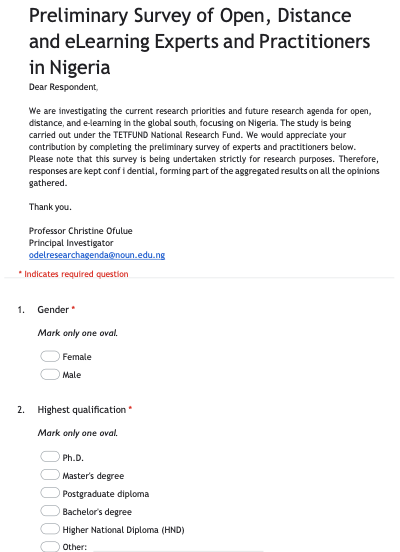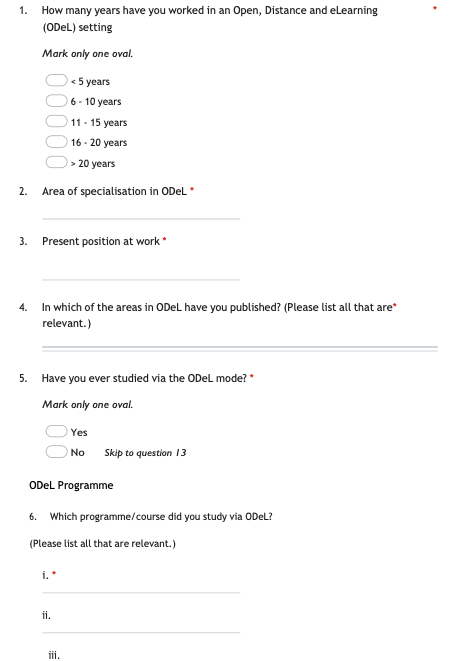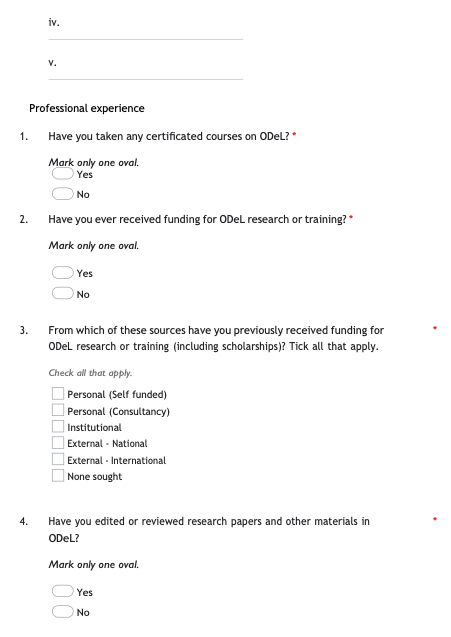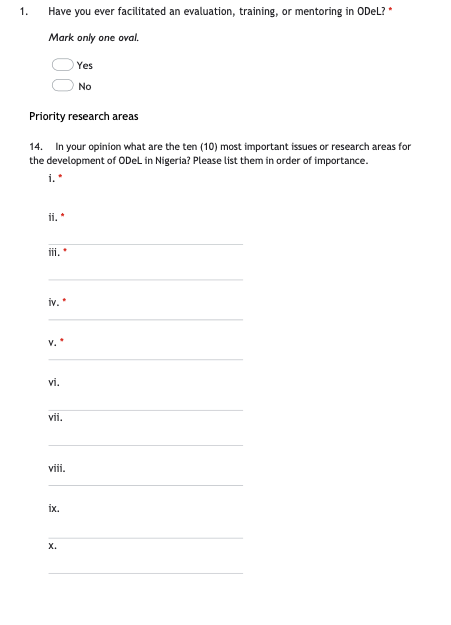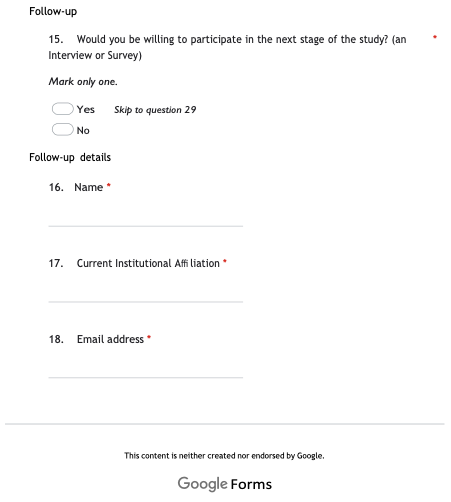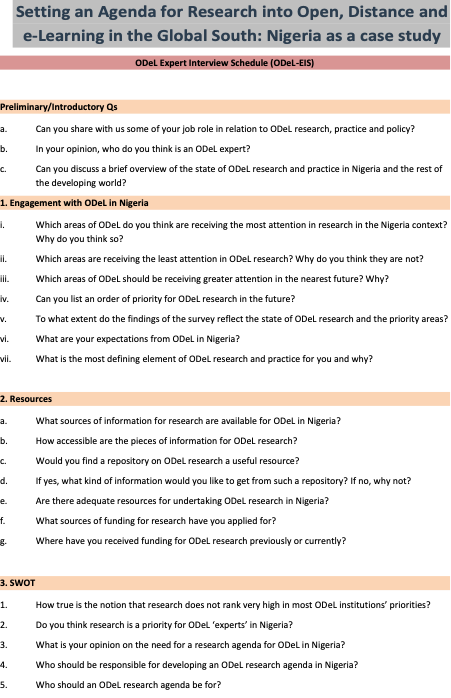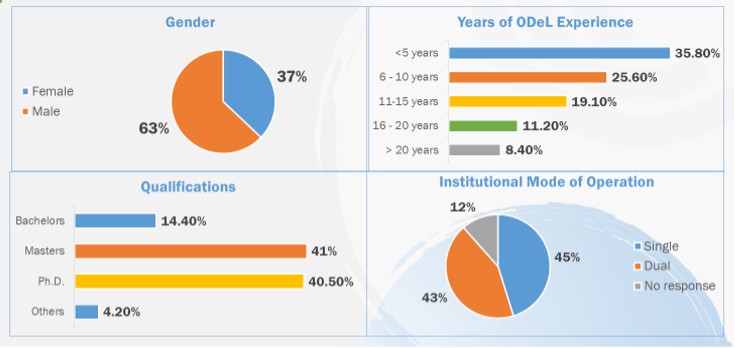
2024 VOL. 11, No. 2
Abstract: The Covid-19 pandemic exposed significant weaknesses in education systems globally, with many African countries, including Nigeria, struggling to respond swiftly to its impact. In Nigeria, the challenge was compounded by ongoing insurgency and insecurity, leading to extended school closures. To mitigate these disruptions, educational institutions adopted emergency remote teaching and learning methods, indirectly highlighting the potential of open, distance, and eLearning (ODeL). However, these initiatives often lacked proper ODeL design and pedagogical components. In response to these issues, a National Research Fund project, sponsored by the Tertiary Education Trust Fund (TETFund) titled "Setting an Agenda for Research into Open, Distance, and eLearning in the Global South: Nigeria as a Case Study" was initiated. The project aimed to identify gaps, high-priority areas, and research trends in ODeL to inform policy and guide practices amidst numerous challenges. This study aimed to investigate priority areas within ODeL that deserve more research attention and to offer insights into how this research could contribute to more resilient educational systems and promote innovative practices. The study employed a mixed-method approach, starting with an online survey of randomly selected 382 ODeL practitioners from Nigerian higher education institutions, followed by in-depth interviews with 26 purposefully selected ODeL experts. The findings revealed a consensus on key research areas, including learner support, technology, and instructional delivery. The study identified emerging research priorities specific to the African context. Addressing these key areas could significantly contribute to developing resilient education systems and promoting innovative educational practices in Nigeria and beyond.
Keywords: research, resilience, priority areas, Covid-19, experts, practitioners
Large-scale disruptions to global education systems have implications for their sustainability if no measures are put in place to mitigate their impact. The Covid-19 pandemic as one such disruptions brought to light huge gaps in educational systems, including ODeL systems globally. Many African governments were unable to quickly respond to the pandemic's effects. In contrast, the Global North has been the subject of considerable research in ODeL, as well as providing a research agenda that informs policy, pedagogy, and practice, enabling education stakeholders to respond more quickly and in informed ways to a disruption. Indeed, literature revealed the benefits of a research agenda for ODeL as a guide for prioritising areas of research focus and systematising ODeL research, particularly in the Global North (Jegede 1994; Jegede 2001; Bozkurt et al., 2015; Zawacki-Richter & Anderson, 2014; Bozkurt & Zawacki-Richter, 2021; Zawacki-Richter, 2009; Perraton, 2000; Zawacki-Richter et al., 2017). In Nigeria, insurgency and instability are daily realities disrupting schools and causing them to close. As a result, several institutions have embraced emergency, remote teaching and learning approaches, realising the potential of ODeL to reduce the impact of disruptions and so contribute to resilience building. Many of these interventions, however, lack the necessary ODeL design and pedagogical elements.
This paper presents findings from a mixed-method study examining the views of practitioners and expert opinions on priority areas of Open, Distance, and eLearning (ODeL) research in Nigeria, crucial for building sustainable and resilient educational systems. It is part of a broader project titled "Setting an Agenda for Research into Open, Distance, and eLearning in the Global South: Nigeria as a Case Study," a National Research Fund (NRF) project, funded by Nigeria’s Tertiary Education Trust Fund (TETFund). The project addresses the lack of a prioritised and systematic research guide for ODeL in Nigeria and proposes strategic approaches to emerging issues, such as disruptions to learning, within the context of the Global South, characterised by limited research and the social, cultural, and infrastructural complexities of ODeL.
Contextualising Zawacki-Richter’s (2009) conceptual framework which categorises research in ODeL across three levels—macro (system), meso (institutional), and micro (individual), the project aimed to outline the state of ODeL research, identify priority areas, and project future needs, informing a research agenda for Nigeria and other developing countries. Through an analysis of expert and practitioner opinions, journal articles, and an exploration of ODeL learners' experiences, the project triangulates its findings to chart the course for ODeL research in Nigeria. The outcomes of this project are expected to extend beyond the Nigerian context, benefiting similar contexts across the African continent. These include: i) a contextualised research framework; ii) an ODeL research agenda; iii) journal articles and monograph publications documenting findings for replication; and iv) an open-source online repository that organises, curates, and disseminates ODeL research works freely accessible to researchers in Nigeria and beyond. The data in this paper is a sub-set from a broader study, focusing specifically on practitioners and experts. The findings from the analysis of these two data sources were triangulated to establish convergence (and divergence) in the views of the two sets of respondents about ODeL research priorities in Nigeria. The aim was to contribute to developing a research agenda for resilient systems and innovative practices in ODeL.
The literature, mostly on research in the Global North underscores the pivotal role of distance, remote, and online learning in fortifying education systems amidst the Covid-19 pandemic's disruptions. It highlights priority areas in ODeL research, existing gaps, future trends and research directions in the literature.
Priority areas identified in the literature include technological shift, enhancing student engagement, and comprehensive pedagogical approaches. In a review of research trends in open, distance, and digital education (ODDE), Panda (2023) traced the evolution of distance education research, highlighting a shift from technology-centred studies to institutional management and pedagogical impacts. In their analysis of online teaching and learning practices, Wong et al. (2016) and Carrillo and Flores (2020) underscored the challenges and opportunities of this shift. Their findings highlight the necessity of a comprehensive pedagogical approach integrating technology seamlessly to ensure that learning remains engaging and effective even in remote settings.
Kahu and Nelson (2020) discussed the importance of designing inclusive and interactive learning experiences that cater to diverse student needs in online learning environments. Prioritising leadership, communication, and administrative support was also identified in the literature. In examining Italy’s adoption of distance learning, Appolloni et al. (2021) identified strong leadership, effective communication, and robust administrative support as key elements for enhancing the resilience of higher education institutions during transitions to online learning.
Bartusevičienė et al. (2021) identified the factors influencing transition to online learning. They emphasise the adequacy of resources, learner support systems, and competencies, showcasing the adaptability and resilience of both staff and students. For China's education response, Xue, Li, Li, and Shang (2020) underscored the importance of prioritising the health and safety of students and staff during the transition to online learning environments. They emphasised that this focus is fundamental to maintaining a supportive and effective educational system.
Additionally, Bao (2020) explored the rapid transition to online education in Chinese universities, highlighting the critical role of technology infrastructure and institutional support. Regarding the psychological wellbeing of staff and students, Bozkurt (2022) advocated for understanding the pandemic's impact on education, managing institutional crises, assessment issues, and the psychological effects on staff and students to enhance the resilience of higher education institutions. This view was supported by Panda (2023) and he called for research attention to addressing mental health issues, which is essential for a healthy and productive learning environment. Studies by Xue et al. (2020), Raghunathan et al. (2022) Zawacki-Richter (2019), Conrad (2018), Weller (2014) and Naidu (2021), that explored resilience and innovation in ODeL, underscore building resilience through factors like social support, flexibility, technological infrastructure, and organisational culture, offering insights into enhancing student engagement, learning outcomes, and institutional strategies.
Panda (2023) surmised that the impact of Covid-19 shifted research focus to emergency remote teaching, teacher training, mental health, and hybrid learning models. In listing key research areas needing attention, he further identified areas including management, student engagement, teacher competencies, blended learning models, and applications of AI and learning analytics.
The research agenda in ODeL has been predominantly shaped by perspectives from the Global North, raising concerns about its representation and applicability in the Global South. Notable gaps include contextualised research in the Global South, research biases, and quality assurance issues and sustainability. Jegede (2016) underscores the need for contextualised research agendas tailored to the educational needs and realities of the Global South, particularly in Nigeria. This involves expanding access, ensuring educational excellence, and promoting national development.
The research objectives for the wider project were to: 1. Validate and adapt a research framework for the Nigerian context. 2. Critically assess the state of ODeL research in Nigeria through a review and analysis of existing research outputs. 3. Identify gaps in ODeL research by determining the most and least addressed research areas from 2000 to 2020. 4. Identify priority research areas and recommend areas of research emphasis. 5. Determine trends and future research directions to optimally impact policy and practice. 6. Set up a repository and mechanism to document, track research, and serve as a referencing tool for ODeL researchers.
In the present study, the focus was on Research Objective 4, i.e., to identify priority areas and recommend areas of research emphasis to inform building resilient education systems and promote innovative practices in the Global South.
This section presents the research methods adopted for this study, highlighting the research design, population, sample, instruments, and procedure for data collection.
The study employed a mixed-methods approach, combining quantitative and qualitative research designs to address the research objective. A preliminary survey was conducted to gather quantitative data on the opinions of ODeL practitioners regarding research in ODeL. This was followed by semi-structured interviews to obtain in-depth qualitative insights from selected experts. The combination of these methods ensured a robust and holistic understanding of the research focus.
Population: The population for the preliminary survey included ODeL practitioners from higher education institutions across Nigeria's six geopolitical zones: north-west, north-central, north-east, south-west, south-east, and south-south. These practitioners were from both single-mode (dedicated to ODeL) and dual-mode (offering both traditional and ODeL programmes) institutions.
Practitioner Sampling: A stratified random sampling method was used to ensure representation across the six geopolitical zones. A total of 700 practitioners were invited to participate in the survey, and 382 responded, comprising 142 females and 241 males from 60 higher education institutions.
Expert Selection: The selection of 26 experts for the qualitative interviews was purposive, aimed at ensuring representation from each geopolitical zone and balancing gender and professional roles. The criteria for selection included:
Quantitative Tool: A 15-item online questionnaire was designed to collect biodata and opinions from ODeL practitioners on priority research areas. The instrument was pilot-tested and validated to ensure reliability and accuracy.
Qualitative Tool: A semi-structured interview schedule was developed, comprising five sections, including questions about priority areas for ODeL research in Nigeria. The interview protocol was pilot-tested with two ODeL experts to refine the questions and ensure clarity.
Questionnaire: The online questionnaire was validated through expert reviews and a pilot test. Reliability was assessed using Cronbach's alpha, which yielded a coefficient of 0.85, indicating high reliability.
Interview Schedule: The semi-structured interview questions were validated through pilot testing. Reliability was ensured by transcribing interviews using both electronic software (Otter.ai) and manual methods to verify the accuracy of the data.
Preliminary Survey: The 15-item online questionnaire was distributed to 700 ODeL practitioners across the six geopolitical zones. A total of 382 responses were received and analysed, representing a diverse sample of ODeL practitioners from 60 institutions. Data analysis involved frequency counts and percentages to identify priority research areas in ODeL.
Semi-Structured Interviews: 26 experts were purposively selected based on predefined criteria. Interviews were conducted face-to-face or via Zoom, depending on the preferences of the interviewees. The interviews were fully transcribed using a combination of electronic transcription software (Otter.ai) and manual methods to ensure data quality. Each transcript was anonymised to protect the identities of the respondents, using coded identifiers (e.g., Johnny Walker as JW). Transcripts were read and analysed to extract responses from the specific question on priority areas for ODeL research. Responses were categorised thematically, and frequencies of identified research areas were aggregated. Thematic analysis was used to determine areas of ODeL that require greater attention, supported by justifications from the key informants. The mixed-methods approach provided comprehensive insights into the research priorities for ODeL in Nigeria, ensuring that the findings were both broad in scope and deep in context.
A total of 382 responses were received and analysed, representing a diverse sample of ODeL practitioners from 60 institutions. The years of experience in ODeL among respondents ranged from less than five years to more than 20 years, with the majority having between six to over 20 years of experience. In terms of qualifications, the majority hold either a PhD or a Master’s degree. The demographic details of the practitioner respondents are summarised in Figure 1.

With reference to the research objective on identifying priority areas, the practitioner group were asked to identify the 10 most important research areas for the development of ODeL in Nigeria. These are the priority research areas that need more attention. The first five responses were made compulsory and respondents were to provide a minimum of five priority research areas. Their responses were assigned codes based on categories of research areas identified in the literature. The research areas were grouped into 19 categories based on the assigned codes and ranked in order of frequency of occurrence across the 10 priorities. Table 1 shows the frequencies and percentages for each research category and the priority assigned as shown in Table 1.
Table 1: Summary of Practitioner Survey Results on Research Priority Areas
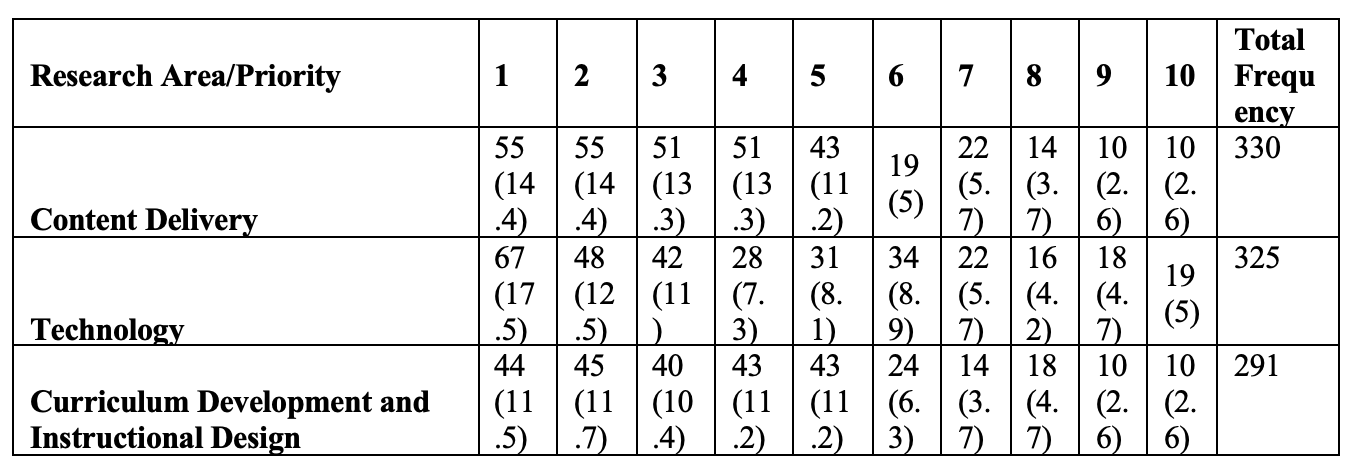
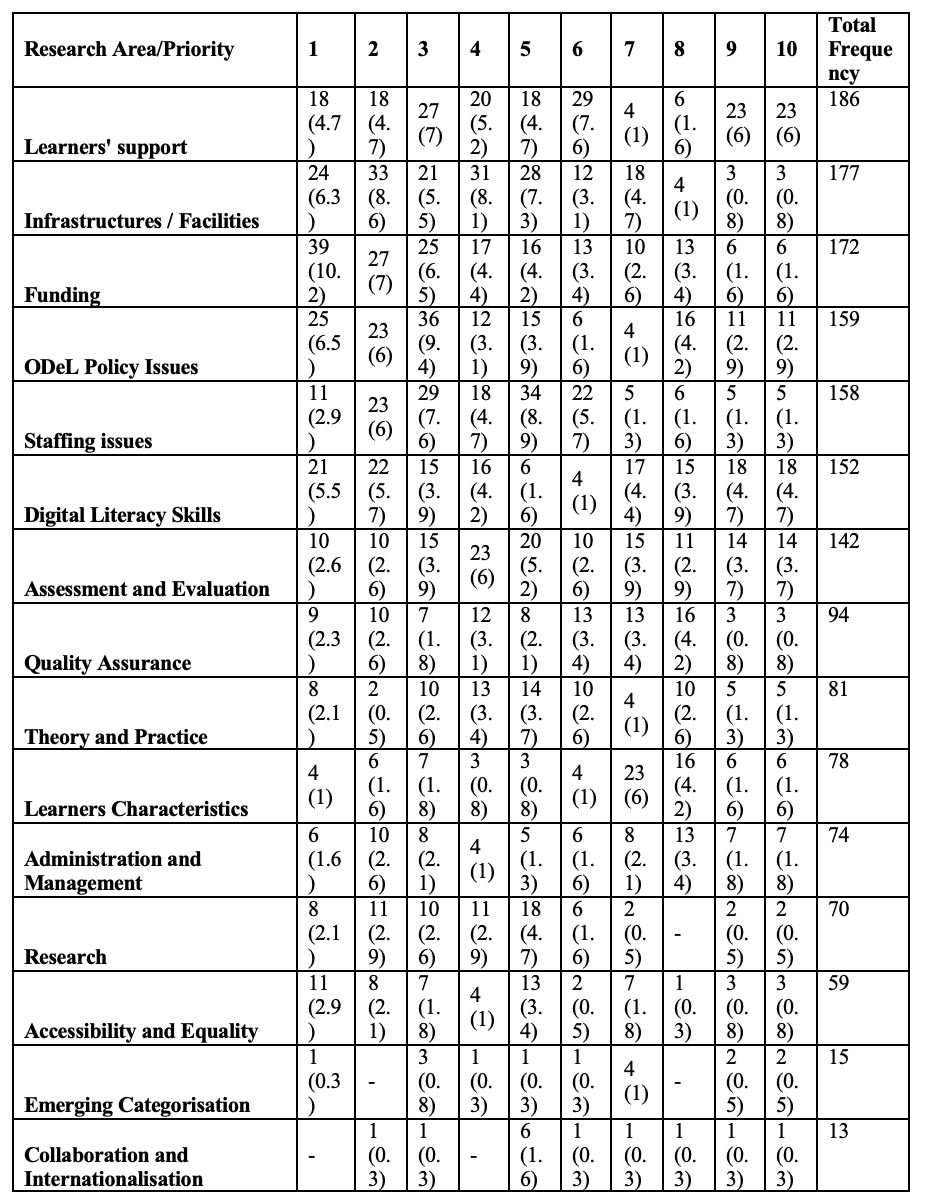

The analysis reveals that among the ten research priorities identified, five categories consistently exhibit the highest total frequencies: content delivery, technology, curriculum development and instructional design, learner support, and infrastructure/facilities. These categories also dominate the frequency counts within each of the top five priorities:
Priority 1: Technology emerged as the most frequently cited category with 67 mentions, followed by content delivery, curriculum development and instructional design, funding, and ODeL policy issues.
Priority 2: The top categories were content delivery, technology, and curriculum development and instructional design. Infrastructure/facilities and funding followed with moderate frequencies.
Priority 3: Like Priority 2, content delivery, technology, and curriculum development and instructional design had the highest frequencies, followed by ODeL policy issues and staffing issues with moderate frequencies.
Priority 4: Content delivery, curriculum development and instructional design, and infrastructure/facilities were the top three categories with the highest frequencies while Technology and assessment and evaluation followed with moderate frequencies.
Priority 5: Curriculum development and instructional design, and content delivery led with the highest frequencies, followed by staffing issues, technology, and infrastructure/facilities with moderate frequencies.
The remaining categories had lower frequencies, indicating less focus or fewer responses in these areas. This analysis underscores the critical importance of the top five research categories in shaping ODeL initiatives and suggests that future research should continue to prioritise these areas to enhance the effectiveness and resilience of educational systems.
The expert group was asked to provide their opinions on the priority research areas for ODeL in Nigeria. The responses were analysed and categorised into themes and patterns, providing a nuanced understanding of current priority areas and future needs. Table 2 presents a summary of the key patterns and trends in the responses of the expert group.
Table 2: Summary of Expert Group’s Responses
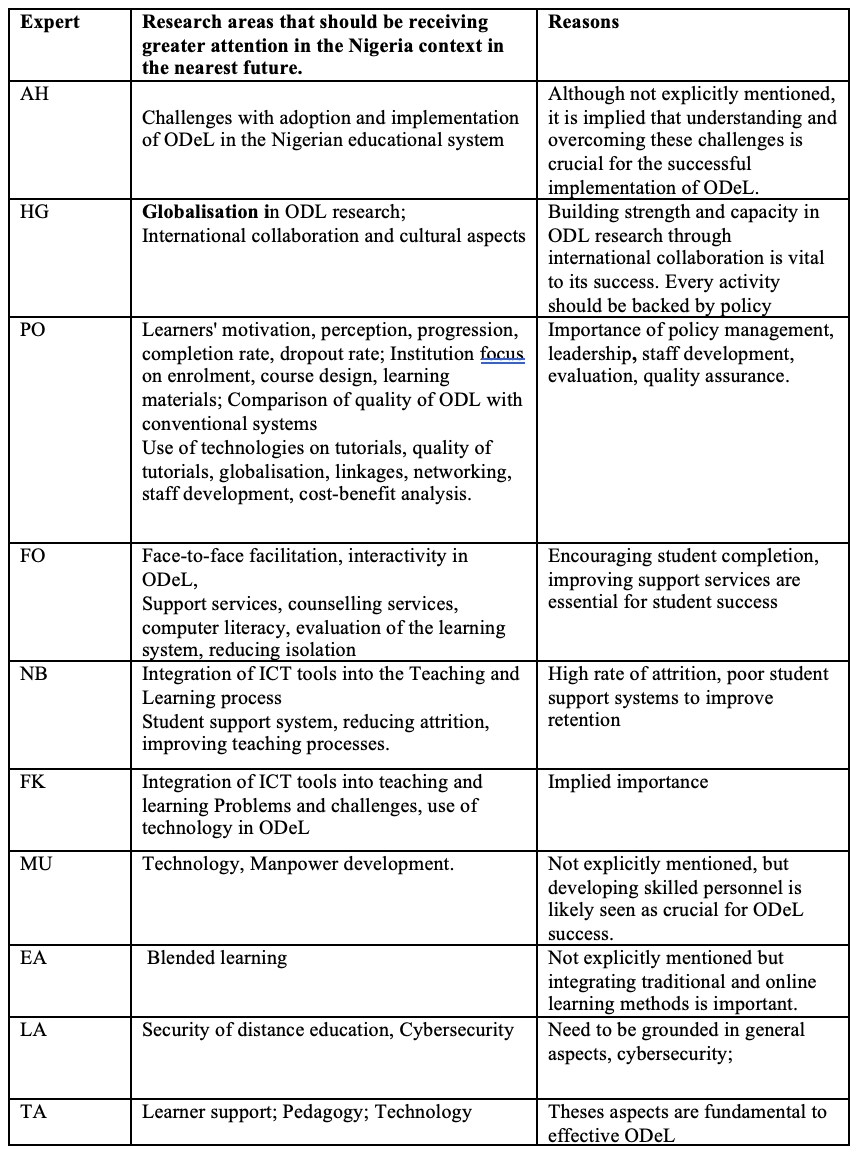
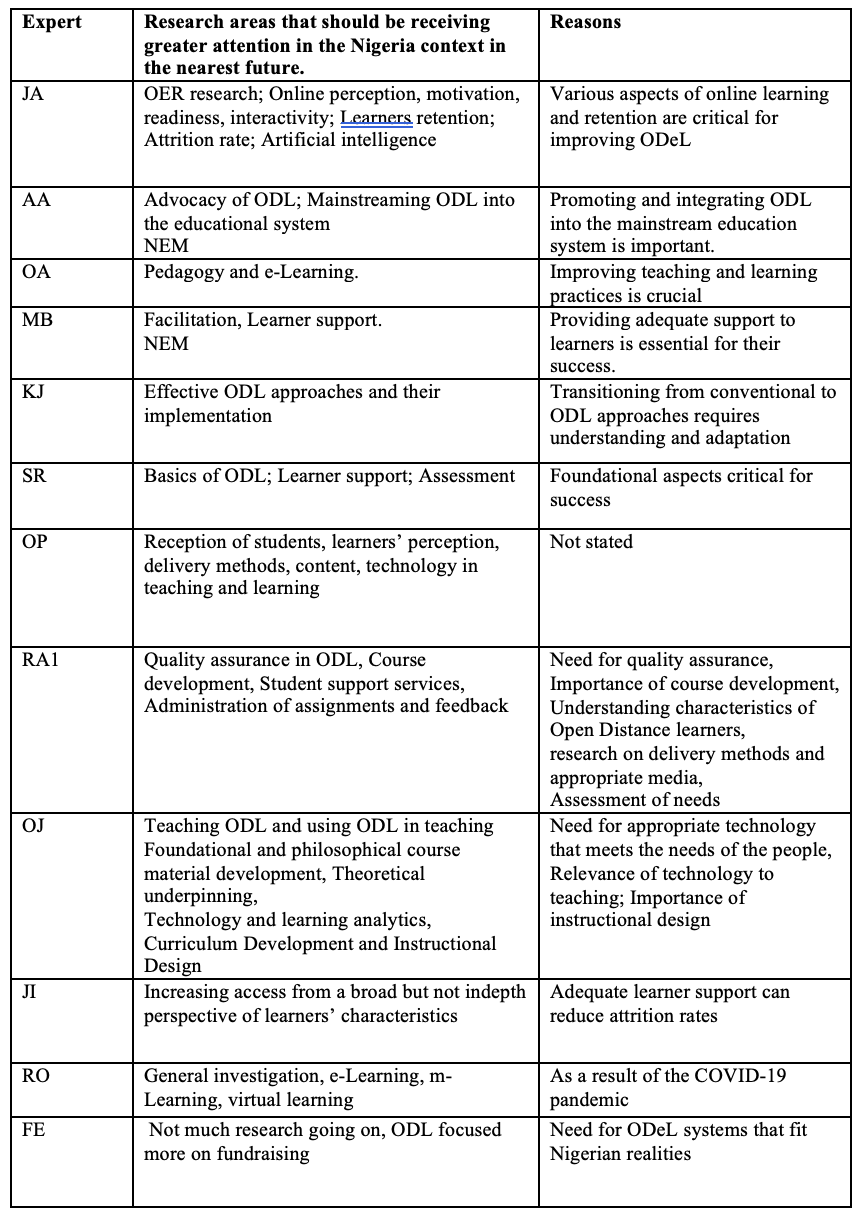
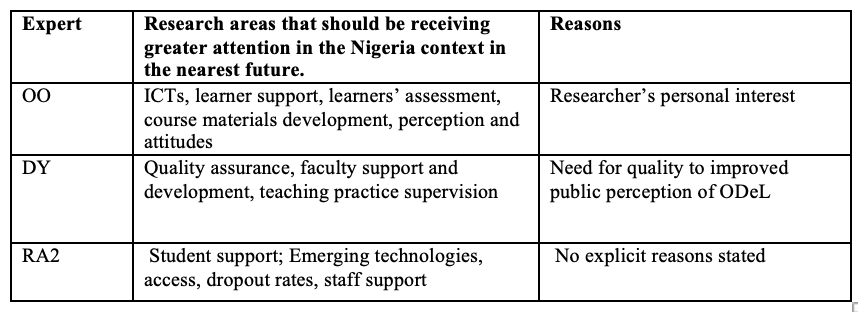
The analysis of these expert group responses reveals the multifaceted dimension of ODeL research in Nigeria. The interpretation of the interview data was structured based on these key themes, providing a comprehensive overview of current priority areas for ODeL research in Nigeria:
Technology Integration: Experts emphasise the need to investigate the potential and challenges of integrating ICTs into ODeL. Future studies should examine the long-term impact of technology on learning outcomes and equity, evaluate the effectiveness of digital tools and platforms, explore innovative pedagogical approaches enabled by technology, and address digital literacy issues among learners and educators.
Learner Support: Experts underscore the importance of research on learner support mechanisms to improve retention rates in ODeL. Future research should evaluate the effectiveness of support interventions, explore approaches to reduce learner isolation, and investigate the relationship between learner support and academic performance.
Blended Learning: Blended learning approaches, combining traditional and online education, were identified as a key research interest. Future studies should investigate optimal blending strategies, evaluate the effectiveness of different models, and explore scalability across Nigerian higher education.
Implementation Challenges: Challenges associated with the effective implementation of ODeL in Nigeria were a predominant focus. Future research should examine infrastructural, pedagogical, and cultural barriers to effective ODeL adoption.
Quality Assurance and Assessment: While not explicitly mentioned, quality assurance and assessment themes were implicit in several research focuses. Future studies should develop quality assurance frameworks and explore innovative assessment methods for ODeL.
Advocacy and Mainstreaming of ODeL: Research into advocacy and mainstreaming of ODeL into the Nigerian educational system is essential. Future research should critically examine the proposed national policy on ODeL and propose evidence-based strategies for effective implementation.
Workforce Development: Research on workforce development is crucial, recognising the need for a skilled workforce to support ODeL initiatives. Future studies should explore effective models for training ODeL practitioners and investigate evolving educator roles.
The expert group’s responses revealed a diversity of issues related to ODeL research in Nigeria, encompassing technological, pedagogical, institutional, and policy dimensions. Future research agendas should maintain this holistic approach while examining each area in-depth.
The findings from the preliminary survey of ODeL practitioners and the interviews with ODeL experts revealed a multifaceted categorisation of research priority areas in Nigeria, aligning with earlier studies and more recent studies, and expanding on them (Panda 2022; Ofulue et al., 2023; Jegede, 2016; Zawacki-Richter, 2009). The survey and qualitative data uncovered both established and new priority areas unique to the Nigerian context, highlighting key issues such as learner support services, technology integration, instructional delivery, course materials development, growth, theory and philosophy of ODeL, assessment, and quality assurance. These areas are critical for building resilience and promoting innovative practices in ODeL.
The significance of robust learner support systems was underscored by the experts, aligning with Bartusevičienė et al. (2021), who highlighted the pivotal role of learner support in remote teaching during the Covid-19 pandemic. Respondent JI, for example, emphasises the need for comprehensive support that addresses various learner needs to ensure access and success in distance learning:
We are only looking at giving access to students to come into the University. But what about other forms of access? Do we look at it? Because if we look at these aspects, which I didn't mention initially, the learner support… Because if you are supporting learners, there are a lot of things that come into Learner Support Services. (JI)
Another expert, AA, stressed the importance of interaction between students and the institution, underscoring the critical role of support services in facilitating learning. Key areas of focus within learner support include learners' perceptions, completion rates, motivation, progression, and learning analytics, which were also supported by a recent work of Panda (2022).
Technology integration was identified as a crucial factor in building resilience within ODeL. Weller and Anderson (2013) argued that resilience in higher education involves the application of technology solutions to change management. This view was echoed by respondent NB, who emphasised the increasing focus of integrating ICT tools into teaching and learning processes:
…a lot more attention is being given to how to integrate ICT tools into the teaching and learning processes. If you go online right now, if you go through different journals you'll find a lot more research, people are a lot more focused on that than for every other area. (NB)
The importance of blended learning, active learning, and student-centred learning methodologies was highlighted as essential components for effective technology integration. These findings align with contemporary practices and literature on the role of technology in education (Panda 2023; Appolloni et al., 2021; Xue et al., 2020).
Instructional delivery is another crucial area promoting resilience through improved student learning systems and enhanced interactivity. Experts emphasised the need for effective content development tailored to online environments. Respondent SR highlighted the importance of developing content specific to various disciplines in an online setting:
…when it comes to content development, because the moment technology comes into ODL design, delivery and facilitation, so to say, we should know that there's a lot to learn by the content developers when it comes to how do you develop content, especially for specific disciplines. And for example, when we talk about the electronic part now, because we're talking about open distance electronic learning, from my own little observation, we don't still see people doing research in the area of how do we develop content in an online environment specific to some disciplines or subjects. (SR)
The transition from traditional print materials to electronic delivery systems, underscored by other experts, reflected the evolving nature of instructional strategies in ODeL.
Quality assurance was identified as a priority area for research, with respondents PO, DY, and FE emphasising the importance of comprehensive quality management in ODeL. PO pointed to the biases in comparing the quality of ODeL with conventional systems, while DY and FE stressed the need for a quality culture within the educational system.
I think mostly, quality assurance is one area that is receiving some research interest mostly, maybe faculty support and development, and then teaching practice supervision as I earlier alluded to. (DY)
This focus on quality assurance aligns with broader literature on ensuring the credibility and recognition of ODeL qualifications (Karam, Fares & Al-Majeed, 2021, Latchem, 2014).
The study also identified emerging priority areas unique to the African context, including infrastructure, high data costs, and digital literacy skills among distance learners and university lecturers. These issues, previously unexplored in ODeL research in the Global South, constituting unique insights from the practitioner data, are critical concerns that should form part of the research agenda for the African ODeL context.
Triangulation of the findings from the practitioner data and expert data regarding the research areas in ODeL that should receive more attention involved a comparison and contrasting of the key themes for convergences and divergencies (commonalities and discrepancies). The key themes from the practitioner data and expert data are presented in Table 3.
Table 3: Summary of Key themes in Practitioner and Expert Data

The triangulation of findings from the practitioner data and expert data revealed some common themes and unique insights.
Technology Integration: Both groups emphasised the importance of incorporating technology into ODeL, including the quality and infrastructure of technological tools used in tutorials.
Student Support Services: Improved student support services, such as enhancing computer literacy, evaluating learning systems, and reducing isolation, were highlighted by both practitioners and experts.
Curriculum Development and Instructional Design: There was a shared focus on effective curriculum development and instructional design tailored to ODL approaches.
Emerging Categories: Practitioners mentioned socio-economic challenges such as poor economic conditions, brain drain, societal poverty, employability, data costs, technology infrastructure, security, and industry-related issues.
Cross-Cutting Issues: Practitioners identified issues like monitoring and evaluation, management support for facilities and human resources, funding for infrastructure, and practical instructions for science-based programmes.
Challenges of Adoption: Experts specifically highlighted the difficulties in adopting ODeL within the Nigerian educational system.
International Collaboration and Cultural Aspects: Experts underscored the importance of international collaboration and cultural considerations in ODL research.
Policy Management and Leadership: The need for strong policy management, leadership, and quality assurance in ODL was emphasised by experts.
Globalisation and Networking: Experts focused on the significance of globalisation, linkages, and networking in ODL research.
The findings underscore the need for a contextualised research agenda that addresses local educational needs and realities in Nigeria. The emphasis on learner support, technology integration, instructional delivery, and quality assurance reflects the critical areas necessary for building resilient and innovative ODeL systems. Future research should focus on:
Enhancing Learner Support: Investigating innovative approaches to reduce learner isolation, improve retention rates, and support learner progression through advanced learning analytics and comprehensive support services.
Integrating Technology: Evaluating the effectiveness of various digital tools and platforms, exploring innovative pedagogical approaches enabled by technology, and addressing issues of digital literacy among learners and educators.
Improving Instructional Delivery: Developing effective content tailored to online environments, incorporating blended and active learning strategies, and transitioning to electronic delivery systems.
Ensuring Quality Assurance: Developing and validating quality assurance frameworks specific to ODeL, exploring innovative assessment methods, and fostering a quality culture within the educational system.
Addressing Emerging Issues: Investigating the impact of infrastructure challenges, data costs, and digital literacy on ODeL adoption and effectiveness, and proposing strategies to mitigate these barriers.
The Covid-19 pandemic disrupted global education systems, revealing the need for resilient and innovative approaches (Pokhrel & Chhetri, 2021). This study, focusing on the African context with Nigeria as a case study, identified key research areas such as learner support, ICT, instructional delivery, and course materials development. There was a consensus among experts and practitioners on these priorities, confirming their relevance through broader survey responses. Additionally, the study uncovered emerging research categories specific to Africa, previously unclassified.
The triangulation of practitioner and expert data highlights the necessity of technology integration, student support, and curriculum development. Experts provided insights into challenges related to adoption, international collaboration, policy management, and globalisation, offering valuable guidance for policy decisions and the formulation of a future research agenda in Open and Distance e-Learning (ODeL).
By addressing these priority areas, ODeL research could significantly enhance the accessibility, quality, and innovation in Nigerian higher education. This study contributes to the expanding literature on ODeL resilience and innovation, particularly in the Global South. It stands out as one of the few to integrate these critical concerns into the research agenda for the African ODeL context, providing a roadmap for future research and development to bolster the resilience and effectiveness of ODeL systems in Nigeria and beyond.
Appolloni, A., Colasanti, N., Fantauzzi, C., Fiorani, G., & Frondizi, R. (2021). Distance learning as a resilience Strategy during COVID-19: An analysis of the Italian context. Sustainability, 13(3), 1388. doi:10.3390/su13031388
Bartusevičienė, I., Pazaver, A., & Kitada, M. (2021). Building a resilient university: Ensuring academic continuity—transition from face-to-face to online in the COVID-19 pandemic. WMU Journal of Maritime Affairs, 20(2), 151-172. doi:10.1007/s13437-021-00239-x
Bozkurt, A. (2022). Resilience, adaptability, and sustainability of higher education: A systematic mapping study on the impact of the coronavirus (COVID-19) pandemic and the transition to the new normal. Journal of Learning for Development, 9(1), 1-16.
Bozkurt, A., & Zawacki-Richter, O. (2021). Trends and patterns in distance education (2014–2019): A synthesis of scholarly publications and a visualization of the intellectual landscape. International Review of Research in Open and Distributed Learning, 22(2), 19-45.
Bozkurt, A. et al. (2015). Trends in distance education research: A content analysis of journals 2009-2013. The International Review of Research in Open and Distributed Learning, 16(1). https://doi.org/10.19173/irrodl.v16i1.1953
Carrillo, C., & Flores, M.A. (2020). COVID-19 and teacher education: A literature review of online teaching and learning practices. European Journal of Teacher Education, 43(4), 466-487. https://doi.org/10.1080/02619768.2020.1821184
Conrad, D. (2018) Editorial. International Review of Research in Open and Distance Learning, 19(5).
Jegede, O. (2016). Open and distance learning practices in Nigerian higher institutions of learning. In Being an Invited Keynote Address at the 3rd University of Ibadan Annual Distance Learning Centre Distinguished Lecture and Stakeholders’ Forum at the University of Ibadan, July, 14th & 15.
Jegede, O.J. (2001). A research agenda for ICDE—A report of the specialist working group/taskforce on research.
Jegede, O.J. (1994). Distance education research priorities for Australia: A study of the opinions of distance educators and practitioners. Distance Education, 15(2), 234-253.
Karam, M., Fares, H., & Al-Majeed, S. (2021). Quality assurance framework for the design and delivery of virtual, real-time courses. Information, 12(2), 93.
Latchem, C. (2014). Quality assurance in online distance education. Online distance education: Towards a Research Agenda, 311.
Naidu, S. (2021). Building resilience in education systems post-COVID-19. Distance Education, 42(1), 1-4. doi:10.1080/01587919.2021.1885092
Ofulue, C. et al. (2023). Mapping the landscape-trends, gaps and future directions of research in open, distance and elearning. Paper presented at the 29th ICDE World Conference, Costa Rica.
Panda, S. (2023). Quo vadis – Stock taking and reflections on researching open, distance and digital education. In R.A. Folake & D. Coetzee (Eds.), Researching DE in the developing context: Building practice into theory. Emerging Scholars Initiative.
Panda, S. (2022). Evolving learner support systems. In O. Zawacki-Richter & I. Jung (Eds.), Handbook of open, distance and digital education. Springer Nature. https://doi.org/10.1007/978-981-19-0351-9_46-1
Perraton, H. (2000). Rethinking the research agenda. International Review of Research in Open and Distance Learning, 1(1), https://doi.org/10.19173/irrodl.v1i1.5
Pokhrel, S., & Chhetri, R. (2021). A literature review on impact of COVID-19 pandemic on teaching and learning. Higher Education for the Future, 8(1), 133-141. https://doi.org/10.1177/2347631120983481
Raghunathan S., Darshan Singh, A. & Sharma, B. (2022). Study of resilience in learning environments during the COVID-19 pandemic. Frontiers in Education 6:677625. https://doi:10.3389/feduc.2021.677625
Weller, M. (2014). The battle for open. Ubiquity Press.
Weller, M., & Anderson, T. (2013). Digital resilience in higher education. European Journal of Open, Distance and e-Learning, 16(1), 53.
Wong Y., Zeng, J., & Kit Ho, C. (2016). Trends in open and distance learning research: 2005 vs 2015. Asian Association of Open Universities Journal, 11(2), 216-227, https://Doi.org/10.1108/AAOUJ-09-2016-003
Xue, E., Li, J., Li, T., & Shang, W. (2020). China's education response to COVID-19: A perspective of policy analysis. Educational Philosophy and Theory, 53(1) 1-13. doi:10.1080/00131857.2020.1793653
Zawacki-Richter, O., Alturki, U., & Aldraiweesh, A. (2017). Review and content analysis of the international review of research in open and distance/distributed learning (2000–2015). International Review of Research in Open and Distributed Learning, 18(2), 1-26.
Zawacki-Richter, O., & Naidu, S. (2016) Mapping research trends from 35 years of publications in Distance Education. Distance Education 37(2) DOI: 10.1080/01587919.2016.1185079
Zawacki-Richter, O., & Anderson, T. (Eds.). (2014). Online distance education: Towards a research agenda. Athabasca Press.
Zawacki-Richter, O. (2009). Research areas in distance education: A Delphi study. The International Review of Research in Open and Distributed Learning, 10(3).
Author Notes
https://orcid.org/0000-0003-3452-5238
https://orcid.org/0000-0001-5124-6439
https://orcid.org/0000-0002-8128-4214
https://orcid.org/0000-0002-7266-9972
https://orcid.org/0009-0004-4096-2156
https://orcid.org/0009-0003-0507-5773
https://orcid.org/0000-0002-6628-4400
https://orcid.org/0000-0002-4528-759X
https://orcid.org/0000-0002-5193-0940
Prof Christine Ofulue is a Professor of Linguistics and a Distance Learning expert at the National Open University of Nigeria. She earned a PhD in Linguistics from Indiana University, Bloomington, USA, and a Postgraduate Diploma in Open and Distance Learning from Indira Gandhi National Open University, India. A US Fulbright Visiting Scholar, Prof. Ofulue has led numerous research and capacity-building initiatives focused on research and quality assurance in open, distance, and eLearning across Africa. Her research interests include sociolinguistics and contact languages, with a focus on multilingual and technologically mediated contexts. In ODL, she emphasises quality assurance and flexible learning in African higher education. She leads the TETFund NRF-funded project "Setting a Research Agenda for ODeL in the Global South: Nigeria as a Case Study" and coordinates the "Implementing Learning Analytics at NOUN" initiative. Prof. Ofulue is the Director of the Regional Training and Research Institute for Distance and Open Learning (RETRIDOL) and the African Council for Distance Education Quality Assurance and Accreditation Agency (ACDE QAAA), hosted at the National Open University of Nigeria. Email: cofulue@noun.edu.ng
Dr Johnson Ayodele Opateye is an Associate Professor of Educational Evaluation at the Department of Educational Foundations, Faculty of Education, National Open University of Nigeria, Abuja, Nigeria. He received a PhD in Educational Evaluation from the University of Ibadan, Ibadan, Nigeria in 2009. He has served in the Faculty of Education as Faculty Examination Officer, Project Officer and Chairman of various Committees. He served as the Zonal Coordinator, North Central Entrepreneurship Incubation Centre and is the current Deputy Director, Africa Centre of Excellence on Technology Enhanced Learning (ACETEL), a World Bank Project won by the National Open University of Nigeria, Abuja. He has worked in various higher institutions, research institutes and private companies in Nigeria. His academic focus is on educational evaluation, assessment for learning in chemistry education, test item development and educational research and assessment in open and distance learning. He is an online content designer and developer for open and distance learning. Email: jopateye@noun.edu.ng
Dr Samuel Awolumate is a seasoned academic and expert in aquaculture and fisheries economics and management, with a strong background in aquaculture, agricultural economics, and rural sociology. He is known for his extensive research and numerous publications (over 40) in local and international journals. With over 10 years of experience in Open and Distance Learning (ODL) institutions, he has made significant contributions to the field. He is a member of several professional organizations, including the Fisheries Society of Nigeria (FISON), the Open and Distance Learning Association of Nigeria (ODeLAN), and the National Association for Artificial Intelligence Practitioners (NAAIP). Email: sawolumate@noun.edu.ng
Felix Kayode Olakulehin is a Lecturer in the department of Educational Foundations and Research Fellow with the Regional Training and Research Institute for Open and Distance Learning, National Open University of Nigeria. His research interests include: open, distance and online learning; higher education; teacher training; social justice and lifelong learning. He has published extensively in leading refereed journals globally. He is the convener of the UK-JISCMAIL Listserv: Research in Distance Learning. and has received scholarships and research grants from organisations such as the Ford Foundation, International Institute of Education, International Council for Distance Education, Commonwealth of Learning, E-Learning Africa, The British Council, etc. He is presently a member of the TETFUND NRF 2020 research team. Email: folakulehin@noun.edu.ng
Dr Adewale Adesina is a Lecturer in computer science and the Foundation Director, Learning Content Management System (LCMS) at the National Open University of Nigeria. Adewale focuses on educational technology, elearning, information management and computer networks. His research interests are in the areas of artificial intelligence, learning technologies, internet security, computer and social media networks. As a learning facilitator passionate about education reform and revolutionising education, Adewale believes in providing every student with a real-life, applicable, engaging, and personalised learning in which they learn how to learn, develop character and integrity, and get inspired to become lifelong learners and world changers. Email: aadesina@noun.edu.ng
Dr Armiya’u M. Yabo National Teachers Institute, Kaduna, Nigeria. Email: armayabo@gmail.com
Dr Bibian Ugoala Dr. Bibian Ugoala is a Senior lecturer in the Department of English, Faculty of Arts, National Open University of Nigeria. Her areas of research interest are on the varied implications of language use in different discursive settings. Dr. Ugoala has published papers on Multimodal Discourse Analysis, Pragmatics, Semiotics, Open and Distance Learning, Artificial Intelligence and Deepfakes. Also of interest to Dr. Ugoala is disembowelling the current spate of disinformation and misrepresentation of information necessitated by the ubiquity of Social Media platforms. Email: bugoala@noun.edu.ng
MrOluwaseun Oluyide is a Lecturer in the Department of Computer Science, Faculty of Sciences, National Open University (NOUN). He also is a Research Fellow at the Regional Training and Research Institute for Distance and Open Learning (RETRIDOL) at the same institution. His research focuses on using Learning Analytics to improve the learning outcomes of students. Email: ooluyide@noun.edu.ng
Solomon Ojedeji, PhD is a Lecturer at the Centre for Literacy Training and Development Programme for Africa (CLTDPA) and is domiciled in the Department of Adult Education, Faculty of Education, University of Ibadan, Nigeria. His research focus is on mobile technologies and the professional capacity building of adult literacy facilitators, ICTs and adult and lifelong learning, learning cities, and learning and development. He is well published in these areas in reputable outlets nationally and internationally. E Email: solomonojedeji@gmail.com
Cite as: Ofulue, C., Opateye, J., Awolumate, S., Olakulehin, F.K., Adesina, A., Yabo, A.M., Ugoala, B., Oluyide, O., & Ojedeji, S. (2024). Developing a research agenda for resilient systems and innovative practices in ODeL: Findings from a national study. Journal of Learning for Development, 11(2), 323-348.
